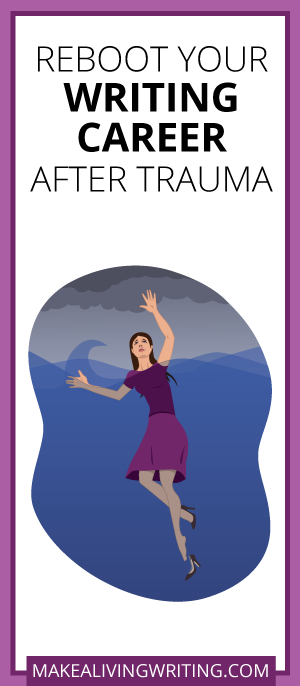 Is your life and writing career moving along in a linear fashion, continuously getting better?
Is your life and writing career moving along in a linear fashion, continuously getting better?
Be honest. It doesn’t work that way for anyone.
The reality is bumpy.
Sometimes you have to abruptly take off work for personal reasons:
- A major illness or death in the family
- An accident
- A baby born prematurely
- Or any number of unexpected and traumatic reasons
I didn’t pick those examples randomly. They’ve all happened to me or my writing friends.
If you step away from your writing career to deal with major life events, hopefully you’ll reach a point where it makes sense to resume work.
But how do you get back on track?
If you’re restarting after taking a break because of trauma, illness the death of a loved one, or some other traumatic life event, here are five tips to reboot your writing career:
Life happens when you’re trying to build a writing career
Back in the summer of 2015, my life and writing career was still proceeding according to plan.
I was a freelance journalist who was perennially short on cash. I finally decided to focus on increasing my income and move into more lucrative forms of writing, especially since I was five months pregnant.
Two steps forward…three steps back
I joined the Den 2x Income Accelerator in August. Exactly a week later, my husband was diagnosed with lymphoma.
My income decelerated…fast. I spent the next seven months taking him to and from appointments, surgeries and emergency hospital visits. I was on the phone for hour with doctors, nurses and specialists. And as his condition worsened, I started looking for clinical trials that might help him. That was just the beginning.
My husband died in March 2016, just two months after our daughter’s birth. In 2016, I had a three-figure income. Then, my mom was diagnosed with stage four breast cancer about a month before my husband died. She died almost exactly a year later.
You can reboot your writing career
Are you in the middle of a traumatic life event? Did your writing career take a back seat to dealing with life-changing circumstances? You’re probably wondering: After things settle down, how will I get my writing career back on track?
It’s been two years since I went back to work, and I haven’t just rebooted my career, I now earn far more than I did as a cash-strapped freelance journalist.
Here’s what I recommend if you’re getting your writing career back on track after an unplanned break:
1. Reach out to old clients…apologize if necessary
I had a blogging client I was still doing some work for at the end of my husband’s life. The Saturday before he died, I had agreed to write two blog posts for this client. I forgot about these blog posts until the client wrote me, several weeks later, to ask why I’d missed the deadline. I told her the reason, and said I wouldn’t be working for a while.
However, when I was ready to return to work, I reached out to this same client. They were happy to have me start blogging again. It was the first step towards my writing career reboot.
Tip: Any client worth having will understand if you missed a deadline because of a death in the family, an accident or illness. Yes, you probably should reach out sooner than later. But even if you’ve been unresponsive for months, it’s worth reaching out to explain what happened and if/when you’d be interested in working again.
And if the client relationship does go south? It happens. Forgive yourself. There are always more clients around the corner.
2. Use your experience to help you reboot your writing career
When I got a nibble from a personal finance site in response to an advertisement I’d put on a local start-up message board, the editor wanted to know what I’d write about.
Guess what? My personal finances were a mess, but I learned a lot about estate planning and life insurance the hard way. I pitched some on ideas related to things I had been through, and I got my first pro-rate blogging client. I later added a grief counselor and an estate planning tech start-up to my roster of clients.
Tip: Whatever traumatic event you’ve experienced, there’s probably a way to leverage that into a writing gig. I don’t write about grief or estate planning much anymore, and I never wanted that to be my niche. But it can be an excellent first step to help you rebuild your writing career.
3. Dump toxic clients immediately
If you’re dealing with grief or with recovery from an illness or injury, you need to prioritize your mental and physical health.
If you have a client that stresses you out, treats you poorly or is otherwise toxic, don’t wait to replace the income—dump the client now. You can’t afford the mental drain. Consider it a form of self-care.
That first blogging client I signed on with? Their submission and revision system began getting more onerous. I started to hate writing for them. I resented the low rates. When I finally dropped them, I was able to focus that time on marketing and land another, much better replacement client.
Tip: I understand it may be hard to drop a toxic client, especially if you’re in a hard spot financially. Sadly, that’s often the case after a traumatic event of any kind. However, getting rid of toxic clients should be your absolute top priority if you’re recovering from any kind of trauma, and you should do so as soon as feasible.
4. Seriously ramp up your marketing efforts
Marketing is always important, but it’s especially essential when you’re trying to reboot your writing career. I focused on sending letters of introduction (LOIs).
None of my LOI stats are particularly impressive. But making an effort to send market consistently (and use different LOI techniques and targets) made it possible for me to rebuild my writing career.
Tip: Don’t be shy about bringing up your experiences in an LOI. I’ve brought up my husband’s illness and death in many LOIs, as well as other experiences—if I think it’s relevant, either to the company’s product or service or to the individual I’m pitching.
The company may not end up hiring you. But if you can bring up a relevant, unusual personal experience, you will get a response. And that’s the beginning of a relationship you need to get a client or referral.
5. Be patient
When I told my therapist that I had broken $1,000 in one month, she looked at me in awe and said: “Wow. That’s fast.” At the time, I was only working at night after my daughter fell asleep, but that still felt like peanuts. And it didn’t feel fast to me. That was two years ago now, and looking back it seems like both fast and excruciatingly slow.
Tip: Realize it does take some time to rebuild your writing career after trauma. But it doesn’t have to take years. When I returned to writing, I was only working part-time, which is often the case if you’re recovering from illness, injury or grief. Focusing on your mental and physical health is important, and means you shouldn’t be putting in 12-hour days.
Writing career reboot: You can do this!
Landing your first client willing to pay pro rates can take a little while. But if you follow these steps, you and your writing career can fully recover.
Ready to reboot your writing career after trauma? Let’s discuss in the comments below.
Emily Omier is a freelance tech writer. When she’s not working, you’ll find her goofing off with her two-year-old daughter.
The post Writing Career Reboot: 5 Steps to Pick Yourself Up After Trauma appeared first on Make A Living Writing.
from Make A Living Writing http://bit.ly/2GsxAv0

No comments:
Post a Comment